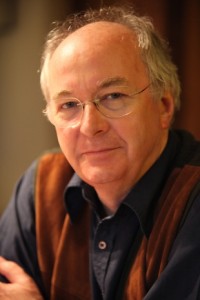 On September 8th, at Homerton College, Cambridge, Philip Pullman gave a lecture on Philippa Pearce and Tom’s Midnight Garden, choosing the concept of time as his main focus.
On September 8th, at Homerton College, Cambridge, Philip Pullman gave a lecture on Philippa Pearce and Tom’s Midnight Garden, choosing the concept of time as his main focus.
As expected, the lecture was brilliant: funny, erudite and confident. Judging by the questions asked after the lecture, the most controversial aspect of Pullman’s talk was his take on the current ‘trend’ for narratives for children and teenagers in the present tense.
‘I see texts in the present tense everywhere,’ he declared, ‘whereas when I was young they didn’t exist. Recently, I visited a Creative Writing class at a university and almost all students were writing in the present tense. When I asked the teacher why that was the case, he admitted he hadn’t even noticed.’
While not directly attacking such narratives, he made no mystery of the fact that he was in favour of the ‘conventional’ past tense. The audience’s responses were interestingly mixed. Someone said – strangely – that she was currently writing in the present tense, despite the fact that she didn’t like reading in the present tense. Other people made bold assumptions that ‘young people’ now preferred the present tense because of the immediacy and the spectacular aspect of that tense. Translation: young people now live solely in the present and need constant stimulation to be able to read (if they manage it at all). Finally, someone laid the blame on a vicious circle at the level of the authors, who ‘feel obliged’ to write in the present tense. Pullman elegantly refrained from making any definite judgement on the matter.
I’m ambivalent. The present tense has never bothered me, either when I read, or as a ‘concept’. In French, my mother tongue, you can write a narrative in more tenses – two different forms of past, and the present (not mentioning the very experimental future tense). Writing in the ‘simple past’ (which is ironically absurdly complicated) makes for a ‘classical’, formal narrative. Writing in the ‘composed past’ is the most informal, relaxed form of narrative (Young Nicholas is an example). Writing in the present tense isn’t connotated either way – you can mould it to make it sound grand, philosophical and nouveau roman, or to make it sound fun, immediate and energetic. A neutral tense, in other words.
It’s a bit easy to assign a form of ideology or social commentary to the present tense. Yeah, it’s tempting to say that it will appeal to people who live in the here and now, refusing to look behind and to pay their respects to their elders. It’s tempting to blame reality TV and live events and the Internet (vade retro).
But we can also look at it another way. Suspension of disbelief in the present tense may actually be more difficult than in the past tense. It might require more imaginative skills than the past tense, and a better ability to navigate between different temporal levels. Especially as narratives in the present tense are often full of flashbacks and flash-forwards. What if narratives in the present tense were actually more complex and demanded more sophisticated reading skills?
Being multimodal young adults constantly plugged in to our iPods, constantly receptive to current affairs, constantly reactive, might very well enhance our ability to imagine ourselves everywhere and everywhen at the same time. Reading and writing in the present tense isn’t necessarily a blind declaration of carpe diem.
by Clementine

